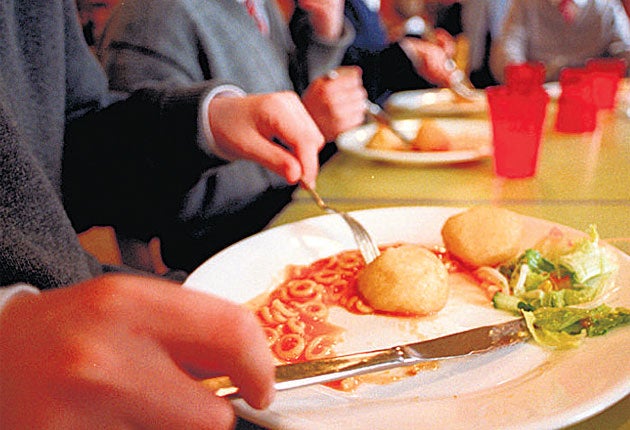Soaring school meal prices threaten to wreck 'Jamie effect'
Efforts to introduce healthy eating by TV chef could be undone as costs jump 10 per cent

The price of a school dinner has jumped 10 per cent this year, an Independent on Sunday investigation has found, sparking fears that the financial crisis and rampant food inflation could jeopardise the "Jamie Oliver effect" of healthy eating for pupils.
A survey of more than 80 UK local education authorities has found that, after years of minimising rises in the cost of school meals, scores of town halls have been forced to impose increases of up to 16 per cent. The cost of a school dinner is now almost £2, with many parents having to pay an extra 50p a week to ensure their child gets a nutritious meal in the middle of the day.
Campaigners last night claimed that the across-the-board increase in the price of school dinners was pushing more of the poorest families out of the market, risking a fall in the health and educational achievements of their children.
The driest spring for decades, which has deprived farmers of water for crops such as wheat, broccoli and potatoes, has caused food prices to soar – with a knock-on effect for local authorities providing meals. The steep upward trend in prices threatens to reverse the drive towards healthier eating in schools over recent years, particularly the "Feed Me Better" campaign launched by Jamie Oliver in 2005.
The campaign, which featured the chef's battle to replace "Turkey Twizzlers" and chips with salads, fruit and better-quality meat, led the then government to introduce new guidelines for school meals.
It was later revealed that the first schools where the changes took place subsequently posted dramatically improved test results.
But a series of councils are now in the process of imposing increases, which will be in force by September at the latest, blaming the financial crisis and the increased costs of basic foodstuffs.
Councillors in Sandwell, in the West Midlands, are this week expected to agree a 10p rise, pushing the price of a meal in a primary school to £1.90 in order to "break even".
North Tyneside has already agreed to increase meal prices by 20p, to £1.80, after holding the fee steady for three years. The cost of meals at Doncaster secondary schools went up from £1.80 to £2.10 – a rise of 16.6 per cent – after Easter.
Research for the School Food Trust, the quango set up in 2005 in the wake of Jamie Oliver's hugely-successful School Dinners television series, has shown that a 10 per cent increase in the price of school meals triggers a corresponding fall in the number of children having them between 7 per cent and 10 per cent.
Last year, the average price of a school meal, calculated by the Trust, was £1.88 across both primary and secondary schools.
The Government has urged schools to join together to bulk buy staple ingredients such as tinned tuna, flour and whole wheat pasta to save money. The research, published earlier this year, reveals that better-quality food leads to a boost in children's learning and health, including helping pupils to focus in lessons.
Linda Smith, of the School Food Trust, said: "Helping schools to get the best deals for their supplies is fundamental for their business planning – we've been advising a project called Food Delivery for Schools, which is helping schools to save money using bulk-buying power. It's also important to remember that changes to school meal prices are rarely just about food costs – caterers also have to consider the impact of wage increases, fuel prices and other overheads, and balance these against their plans to build their market."
Hugh Griffith, of Somerset County Council, said prices had risen by 5p per meal in each of the past three years. He said: "This has been due to substantial increases in the cost of basic foodstuffs, particularly some dairy products such as cheese and staples such as rice.
"As Somerset is a rural county, requiring school meals to be delivered by road, fuel cost rises have had a significant impact on the final meal price."
A spokesman for the Child Poverty Action Group, which campaigns for universal free school meals, said: "Children from low-income families eat fewer veg and wholemeal breads, and eat more pizza, fat spreads, processed meats and sugar than children from higher-income groups. Healthy school meals can decrease these dietary inequalities."
Join our commenting forum
Join thought-provoking conversations, follow other Independent readers and see their replies
Comments
Bookmark popover
Removed from bookmarks